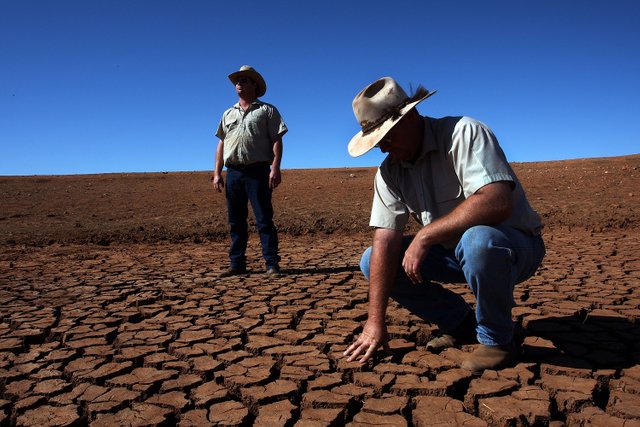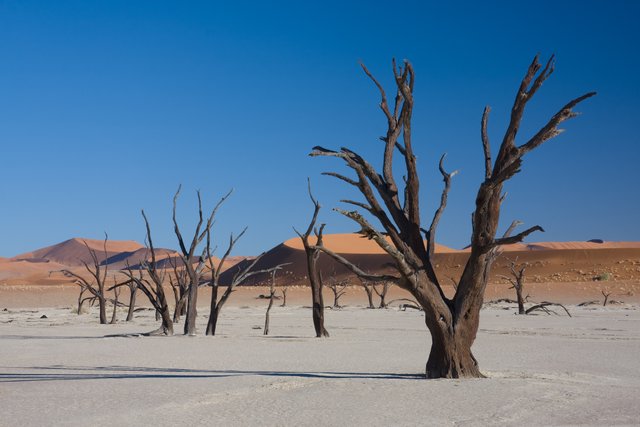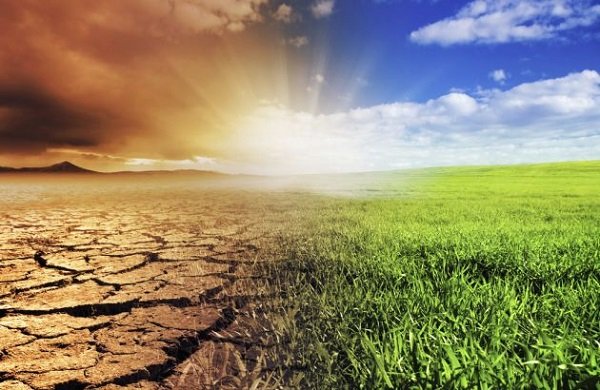Global Warming: More Than Just an Inconvenient Truth!

Like virtually all credible climate scientists, atmospheric physicist Richard Lindzen agrees that the Earth is growing warmer. He also agrees that "greenhouse" gasses in the atmosphere, such as methane and carbon-dioxide, contribute to the Earth's warming by trapping light and heat that would otherwise escape into the surrounding space. Lindzen, however, is seemingly unconvinced by any argument that suggests that the warming might be hazardous, or that societies should take steps to mitigate the incessant release of these so-called greenhouse gasses. In his popular essay “Exchange on Climate Science and Alarm” Lindzen attempts to argue that the alarm surrounding global warming is not rooted in fact. The core of Lindzen's stance, however, is based on patently-false beliefs. Contrary to the most popular climate models, Lindzen predicts that the average global tempertature of the Earth will increase by less than a degree over the course of the 21st century (Lindzen 22) With this in mind, he believes that the accompanying impact on the climate will be negligible-- so negligible, in fact, that scientists of the future will scoff at our generation for even considering that our actions might trigger problematic warming (Lindzen 32). He is not alone in this belief. As of 2003, less than half of Americans believed that global warming was taking place, and even less believed that it was cause for concern or a result of human activity (Gelbspan 2). Senator James Inhofe of Oklahoma went so far as to call global warming "the biggest hoax ever perpetrated on the American people" (Gelbspan 37). Even today, many Americans are convinced that the global warming hype is a great ponzi scheme orchestrated by fear-mongering liberals. At the risk of sounding like a fear-mongering liberal, I am compelled to explain that the truth of the matter is far graver than Fox News or Richard Lindzen would have you believe. The current warming trend is not a part of a natural cycle, as many pseudo-scientists like to declare, and-- rather than merely posing an inconvenience-- the consequences of our collective apathy could be catastrophic. Unless we are able to drastically reduce greenhouse gas emissions in a very short amount of time, humanity will face a genuine calamity with the potential to disrupt much more than our delusional confidence.

Fortunately for everyone, Lindzen's perspective represents a minority, a tiny fraction of the scientific community that believes global warming to be a hyped-up, undaunting issue. The nearly unanimous scientific consensus, and Lindzen's persistent denial, prompted Dana Nuccitelli of The Guardian to write a scathing critique of the scientist, in which she portrays him as a sort of paranoid conspiracy theorist. She writes, "Lindzen would have us believe that tens of thousands of climate scientists around the world are all tossing their ethics aside and falsifying data in order to keep the research money flowing, even though contrarian climate scientists like Lindzen have had no trouble obtaining government research grants. Is this more plausible than the alternative explanation that 97 percent of climate research is correct, and Lindzen, whose claims have consistently been disproved by observational data, is wrong?" (Nuccitelli 1) Nuccitelli's observation is valid, even if it fails to address Lindzen's argument. Clearly, it is highly unlikely that "97 percent of climate research" is incorrect. However, Lindzen is not mistaken when he argues that no climate model is perfect. After all, the algorithms being used today do not perfectly match-up with the data collected over the last century. Hypothetically, Lindzen's prediction of a less-than-one-degree temperature increase over the next century could actually come true, but would the consequences be negligible? Many Americans believe so, but numerous studies suggest otherwise.
One degree seems, at first glance, to be a very small amount. After all, on a seventy-two degree day we can hardly even notice if the air warms up to seventy-three degrees. On a micro scale, one degree is of no consequence, but a global increase of one degree is quite significant, particularly when it is taking place in only a hundred years time. The most recent Ice Age was only five celsius degrees colder than today, and these conditions formed over the course of thousands of years (Lynas 46). Temperatures rose roughly .7 degrees Celsius in the 20th century, and the records-- tree rings, ice rings, coral bands, etc-- all indicate that temperatures haven't been this high in over 1,300 years (Lynas 47). In fact, we are one degree away from the hottest temperatures the Earth has seen in over a million years, and as Dr. Veerabhadran Ramanathan put it, in a 2005 address to a meeting of the American Academy, "the rapidity of the increase leaves little doubt that human impact is the cause" (Lynas 47, Ramanathan 36). But why should we care? Most of us would agree that the present conditions are bearable, so why worry about a one degree increase?
The arctic ice cap has been receding steadily since 1980, and in September 2005 alone, a chunk of Arctic ice the size of Alaska disappeared completely. Virtually all climate scientists agree that a one-degree increase in temperature will spell doom for these glaciers, and certainly the consequences of a melting North Pole are multi-faceted. First, there is the obvious increase in sea-level, which is one of the chief concerns of global warming alarmists, but another, less-obvious concern is the effect on the Earth's albedo, or reflectivity. Bright, snow-covered ice has been shown to reflect almost 80% of solar radiation, while ocean water, on the other hand, absorbs as much as 95% of solar radiation (Lynas 48). The melting of polar ice caps thus creates a feedback loop. As temperatures increase, the ice melts. As the ice melts, more solar radiation is absorbed by the planet, and the heating of our planet accelerates. Glaciers also trap immense amounts of carbon dioxide, which is released into the atmosphere as the glaciers melt. Now we must wonder if "one-degree" is a plausible estimate for the increase in temperature. Mark Lynas, in his award-winning book Six Degrees, invokes the concept of a "tipping point." As is plain to see, a one-degree increase in temperature would accelerate the very processes that led to that same temperature increase. "The tipping point" becomes a frightening analogy, because it is unclear whether or not we have already triggered the feedback loops that will inevitably lead to warmer temperatures and worldwide changes in climate.

Another such feedback loop is the carbonation and, by consequence, acidity, of the Earth's oceans. The more carbon there is in the atmosphere, the more carbon there will be in the oceans. This can become problematic because the presence of carbon dioxide lowers the PH of water, or in other words makes it more acidic. Ocean-dwelling plankton rival trees and plants in their ability to sequester large amounts of carbon, but plankton are endangered by the acidity entailed by the growing presence of carbon-dioxide in the oceans. Some plankton will be suited to these conditions and carry on, but, at a certain point, the vast majority of the Earth's vital plankton will lose their battle against descending PH levels, and an unfathomable amount of carbon-dioxide will be released into the atmosphere, further contributing to the symbiotic cycle of warming and pollution (Kunzig 1). Some scientists even fear "runaway greenhouse effect" or "Venus syndrome," a theory that suggests that the aforementioned feedback-loops might be irreversible, and cause our planet to become, essentially, a big, hot ball of acid, comparable to the planet Venus (Kunzig 1). This may not occur after a one-degree increase, or even two, but all indications suggest that a one-degree increase will guarantee further increases in temperature, and there's no telling where the dial will finally come to rest. Like a rocking canoe, eventually the climate will tip, and when it does, we may find that our entire way of life has been turned upside down.
The entire world seems to be neglecting this possibility, and our hubris is embodied by the current International standards as well as The United States of America's own climate policy. David M. Drieson, editor of MIT's Economic Thought and US Climate Change Policy, wrote of The United States: "Once a leader in addressing international environmental challenges, became a vigorous opponent of action on climate change over the past two decades, repudiating regulation and promoting only ineffectual voluntary actions to meet a growing global threat" (Drieson). Drieson's assertion about the United States calls to mind a European advertisment that Robert Pielke Jr wisely included in his 2010 book The Climate Fix. "YOU CONTROL CLIMATE CHANGE," the EU-funded advertisement informs us. This belief is indicative of a profound ignorance, as it is the structures of our global society that lead to pollution and subsequent climate change. Turning out your bathroom light or carpooling to work might save you some money, but it will not save the planet. The efforts of a single individual cannot make the slightest dent unless that individual can find a way to reduce global carbon emissions. This is a job for technological advancement and strict international pollution regulation. Unfortunately, neither is being put to practical use. Solar power, which has made enormous strides in efficiency, accounts for a marginal amount of energy production (Goodell). Meanwhile, the Kyoto Protocol, the current international standard for greenhouse gas emissions, is weak and insufficient.

So what are we doing to combat the threat posed by global warming? In many ways, the proposed solutions to global warming are as frightening as the phenomenon itself. In his book How to Cool the Planet, Jeff Goodell proposes "solar radiation management" (SRM) and other forms of "geoengineering" as temporary or perhaps permanent solutions to climate change. Goodell interviews David Keith, a "Geoengineer" who proposes saving the Arctic ice cap through SRM techniques, and believes that geoengineering can and will slow global warming long enough for us to find a more long-term solution (Goodell 39). Although it sounds like science fiction, geoengineering is growing in both advocacy and notoriety. Bill Gates has provided funding for geoengineering research, The United States Government has been devoting money toward this research since the 1960's, and the UN discussed geoengineering in its most recent climate summit (Goodell). A few years ago, David Keith was interviewed by Steven Colbert on his show The Colbert Report. In the interview, Keith advocated the use of "stratospheric aerosols" to limit the amount of solar-radiation reaching the surface of the Earth. Keith hopes to use planes to spray reflective, cloud-seeding chemicals that will artificially increase the Earth's albedo, and, in doing so, lower tempertatures and increase precipitation. Colbert seemed, quite-reasonably, dubious about the proposition. He questioned the proposed use of sulphur derivatives in the spray, citing the millions of pollution-related deaths annually. When Keith declared that his plan would contribute only a 1% increase in aluminum and sulphuric acid pollution, Colbert cleverly responded that the plan would kill "only about ten-thousand people." Al Gore has also expressed skepticism about the idea of deliberately manipulating the weather. He appeared on The Ellen Degeneres Show in order to promote his book entitled The Future, and he spent the vast majority of his air time voicing his concerns about geoengineering, going so far as to say "it's absolutely nuts."
Scientists agree, however, that planes can be effectively used to lower temperatures. A nationwide study conducted in the wake of 9/11 found that the average temperature was three degrees lower in the absence of air-traffic. The presence of contrails, natural or artificial, really can lower the temperature. However, as noted by Roger Pielke, Jr. in his book The Climate Fix, considering "geoengineering" solutions encourages politicians and lay-people to dance around the root of the issue (Pielke 142). Even if solar-radiation management is effective in lowering temperatures, a reliance on this technology will lead only to further reliance. As the root of the problem continues to grow, we will be lulled into a false sense of comfort. We will continue burning fossil-fuels and spraying the skies, digging a deeper hole as we await a miracle fix that may never come.

As the greenhouse effect plainly demonstrates, not all clouds have a cooling effect on the temperature. The less reflective a cloud, the more likely it is to trap heat. This is made relevant by the fact that massive brown clouds of atmospheric pollution hang in sporadic locations across the globe. One such brown cloud, studied first-hand by Dr. Veerabhadran Ramanathan, was roughly the size of "an entire continent and ocean" and composed of human-made sulfates, nitrates, organics, black carbon, dust and fly ash particles, and natural aerosols such as sea salt and mineral dust" (Ramanathan 37). Most of us are aware of the giant islands of discarded plastic floating around in the world's oceans, but few of us consider the more hazardous island of carcinogenic, light-trapping chemicals hovering above us, thickening and spreading everyday. The presence of this haze cools the land or ocean beneath it, but it has the opposite effect on the surrounding atmosphere. According to Dr. Ramanathan's research, the surrounding atmosphere experiences a 50-100% increase in solar-radiative heating, while the ocean beneath experiences on a 10% reduction in heating (Ramanathan 37). The net effect on temperature is unclear, but what is clear is humanity's role in producing these noxious, brown clouds. As Dr. Ramanathan observed, "Measurements from aircraft, ships, and surface stations... found that biomass burning and fossil fuel combustion contributed as much as 75 percent to the observed aerosol" (Ramanathan 37).
At the end of the day, both pollution and the subsequent greenhouse effect are the result of human activity, more specifically the burning of fossil fuels. While a tiny minority of scientists-- people like Robert Lindzen-- predict a temperature rise of less than one degree over the next century, the other 97% of scientists predict temperature increases from one degree all the way up to six degrees and beyond. It is terrifying then, that our world is being led by people like Donald Trump, who recently withdrew the United States from the Paris Climate Accord and reiterated his promise to revive the American coal industry. Reckless, pandering decisions such as these put the future of our planet in jeopardy. We have already noted that the last ice age was only five degrees cooler than the world today. Imagine, then, the consequences of a six degree increase in only one hundred years. Storms, fueled by warm water, may grow to epic proportions and batter coastlines without relent. Glaciers will melt virtually worldwide, and the resulting increase in sea level will drive coastal communities to migrate by the millions. In China, for example, nearly one hundred million people could potentially be displaced by rising sea levels. Drought is a huge concern, because our immense and ever-growing population relies upon a steady supply of food. Without good soil and good crops, the entire system falls apart. Finally, we will be powerless to defend ourselves from these dangers, as we will quite literally run of power once we finish depleting our fossil fuels. Sadly, it seems understanding and practical change may not come about until the last drop of oil has been burnt, and the last leaf has fallen.

Driesen, David M. Economic Thought and U.S. Climate Change Policy. Cambridge, MA: MIT, 2010. Print.
Gelbspan, Ross. Boiling Point: How Politicians, Big Oil and Coal, Journalists, and Activists Are Fueling the Climate Crisis--and What We Can Do to Avert Disaster. New York: Basic, 2004. Print.
Goodell, Jeff. How to Cool the Planet: Geoengineering and the Audacious Quest to Fix Earth's Climate. Boston: Houghton Mifflin Harcourt, 2010. Print.
Kunzig, Robert. "Will Earth's Ocean Boil Away?" National Geographic. National Geographic Society, 29 July 2013. Web. 02 Nov. 2014.
Lindzen, Robert. An Exchange on Climate Science and Alarm. Is The Global Warming Alarm Founded on Fact?. March 2008. Pp.21-53. Web.
Lindzen, Richard. A Case Against Precipitous Climate Action. Taking Sides: Clashing Views on Global Issues. Vol. 8. 2013. P 75-77. Print.
Lynas, Mark. Six Degrees: Our Future on a Hotter Planet. Washington, D.C.: National Geographic, 2008. Print.
Nuccitelli, Dana. "The Weekly Standard's Lindzen Puff Piece Exemplifies the Conservative Media's Climate Failures." The Guardian. Guardian News, 6 Jan. 2014. Web. 2 Nov. 2014.
Cover Photo: Image Source
How can we do this to ourselves?
Beijing smog
Excelente interrogante, Es triste que el platena se este acabando , no hay consideración, sólo piensan en el bien propio sin darse cuentas que los que hacen este tipo de acción también se están destruyendo, el ser humano necesita tener más querencia por el platena!
Tema importante y de gran reelevancia para la vida en este planeta, el cual siendo destruido lentamente por la mano indiscriminada del hombre en su afan de obtener una vida cómoda y mucho bienestar, apoderandose y depredando salvajemente el ambiente, contruyendo industrias que expanden gases tóxicos perjudiales para todos los seres vivos. Interesante post.
Global warming threatens to eliminate half of the species that today inhabit the planet, and at present we still do not realize,
Very thoroughly written article with references to support every statement. Intersesting and horrofying at the same time. I fear that global warming is attracting less media attention now compared to a few years back even though the subject is as important as ever.
El calentamiento global es un tema de gran importancia, ya que nos afecta a todos, debemos de tener conciencia y no seguir dañando el planeta, las grandes industrias petroleras con su afan de seguir explotando el petroleo y ahora con el nuevo método y el avance tecnologico para la explotación del mismo estan causando estragos en la naturaleza!
Gracias por compartir es un tema sumamente importante que vale la pena compartir.
learn to care, the earth has a disease called global warming, do you want to participate in its healing? or continue, being part of your illness? what side are you on?
I hope people understand that we must take care of our planet, that there is no other, and that we are now must leave a better world for future generations, and teach our children to take care of what we are leaving, something as simple as disconnect the cell phone charger, is to contribute so that the earth lives, may God help us. Since childhood I teach my two children to take care of our only spaceship.
ojala las personas entendieran que debemos cuidar nuestro planeta, que no hay otro, y que los que estamos ahora debemos dejar un mundo mejor para las generaciones futuras, y enseñar a nuestros niños a cuidar lo que les estamos dejando, algo tan sencillo como como desconectar el cargador del celular, es contribuir para que la tierra viva, que Dios nos ayude. Desde pequeño les enseño a mis dos hijos a cuidar nuestra unica nave espacial.